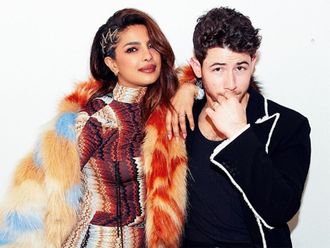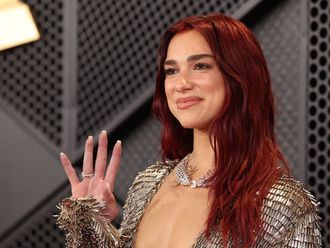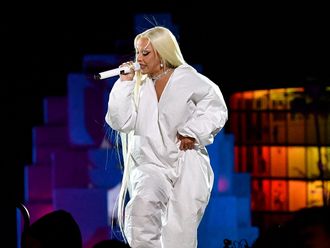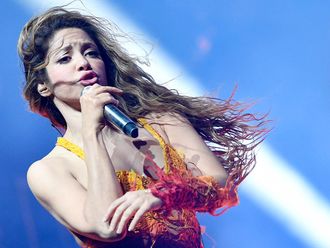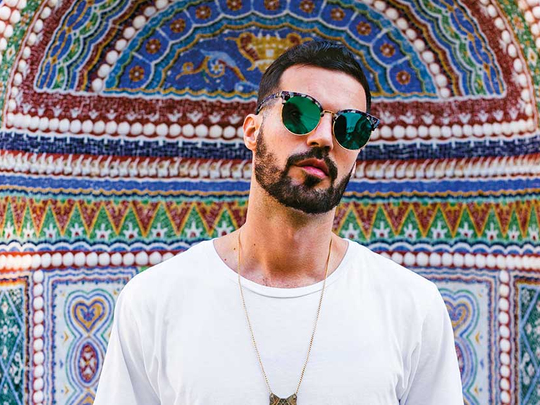
Outlandish as it seems, Emirati music producer Issam “Icekream” Freiha wants to make music for aliens. He’ll settle for humans until then.
Equal parts freshly dressed and sharply focused, the 32-year-old hip-hop artist belongs to a new breed of regional artists, who are veering into experimental realms with no blueprint to guide them.
The past isn’t promising for Freiha. Many before him have tried to emulate hip-hop’s best yet failed to capture the attention of the general public — let alone outer space. But Freiha, along with long-time collaborator Majeed, have dared to find their own footing on their latest EP, Night Feel.
The five-track record is both contemporary and ripe with experience. It encapsulates the sound of Eastern and Western live wires, jiving at different voltages and sparking where they touch. Perhaps a testament to where Freiha’s been, and where he hopes to go.
The ‘dark and psychedelic’ EP, as Freiha describes it, launched across streaming services earlier this week. In the wake of its release, he told Gulf News tabloid! what it took for him to get here — and how he lost and regained his father’s faith along the way.
You’ve collaborated with Majeed before. How did you meet, and why do you like working together?
Majeed hit me up about three years ago. He discovered my music on SoundCloud and was impressed. At least, I hope so. He proposed we collaborate on some music. About two years later, we worked together. I find we have a solid musical connection that translates well into the vibe of our music. He is a true artist and he appreciates my production skills, so there is a harmony in our collabs.
What was the process of creating your latest EP, Night Feel?
It took us about three months and since we were not physically in the same location, we had to work remotely for a lot of the time. That meant he would send me his vocals and I would in turn send him my beats and we would do a mash up of the two and play around with it until we got it right.
Being Emirati, how did you get into the electronic music scene?
A: I got into EDM at an early age as I was exposed to electronic music growing up in [France]. French House Music and EDM was huge.
Have your family and friends been supportive?
Have my friends and family been supportive? Yes and no. They were initially supportive when we were just pre-teens messing around with AcidPro, DJing and going to studios for fun. As I got older, my father’s support dwindled as I did not uphold my promise to get a degree but instead let my academic journey go completely off the rails. After years of empty promises that I would get a bachelor’s degree, he had had enough. After reaffirming my goals and getting a game plan together, my father’s support was once again bestowed on me. That’s a happy ending in my book.
What’s the biggest obstacle you’ve faced as a musician so far?
Breaking into the industry was and still is the biggest obstacle I have faced. I am talking specifically about the American hip-hop industry — there are so many people ahead of the game. They are just like me, waiting in line to be the next breakout music producer. It seems like you have two options: make it on your own or force your way in.
Where are you based now, and where have you lived in the world?
I am based in the UAE, but I have lived in France, the UK and the US.
Who were some of your inspirations growing up, or even right now?
IAM (French hip-hop group), Cut Killer, DJ Premier/Gangstarr, The Neptunes, Dr.Dre, Jamiroquai, Eric Sermon, 40, FatBoy Slim, Alain Brax, Daftpunk, Wu-Tang, 2Pac, A Tribe Called Quest, Cypress Hill, 213 (Snoop, Nate Dogg & Warren G), Eminem, Lil Wayne, Drake and Michael Jackson. I can go on. I also love Latin Trap and Reggaeton.
What were you like when you were younger? How much have you changed compared to teenage you?
In all seriousness, I was more careless and wild and now, as an adult, I have become much wiser, calmer and definitely more intelligent. [laughs] I look back at some of the decisions I made and marvel at my total disregard for the consequences it would have on me as an adult and want other young Emiratis to not squander their resources and energy on actions that will not only waste their time but potentially be detrimental to their career.
How did you decide on your name, Icekream?
I went to a French school for many years and they pronounced my name as ‘Esam’, and then when I moved to a British school in Paris, they pronounced my name as ‘Eye-Sam.’ The first syllable is ‘ice’ when pronounced that way. So when I started DJing, I wanted to come up with a stage name but Ice Cube and Ice-T were taken, so [the] next available one was Icekream — with a k to add some sauce to it.
It seems like Icekream is a total package, more than just music, but with an aesthetic, too. What’s the Icekream brand all about?
The Icekream brand is all about different flavours. Pun-intended. Musically, that is what I aim to offer my audience. When you listen to all my tracks, you’ll find the sound varies and that’s what the icekream brand offers. [It] ultimately is an eclectic mix of rhythm and flow.
You have a contemporary sense of fashion, too. What inspires your style?
A: My father is my style icon. Growing up in Paris, after Italy, it is probably the second-best fashion capital, so that’s what I owe my suave taste to.
Who do you want to connect with through your music?
A: Where I am on my music producing journey, I am reaching out to a global audience. Later on, though, I hope I do garner a universal audience. I have to say, one day, I would be ecstatic to see aliens jamming to my music. For now, I will settle with connecting with the world.
What’s next for you?
After Majeed’s and my EP, I have my EP with TroyBoi and a solo EP coming up. I can’t wait. There’s definitely a tour in the works, so watch this space for what’s to come.
QUOTE/UNQUOTE:
Quizzed about the Drive-esque artwork for Night Feel EP, a neon-pink illustration of two silhouettes and a car surrounded by palm trees, Freiha said: “The album artwork is inspired by this amazing [London-based] artist called JayPrints. I spent quite some time in Miami and Majeed used to study in Miami for a few years, as well. We both felt that palm trees are representative of both the UAE and Miami. Plus, we wanted a retro Miami look with that ‘80s touch. Last but not least, the cover is a nod to the prominent motorhead culture in the UAE and the US.”



